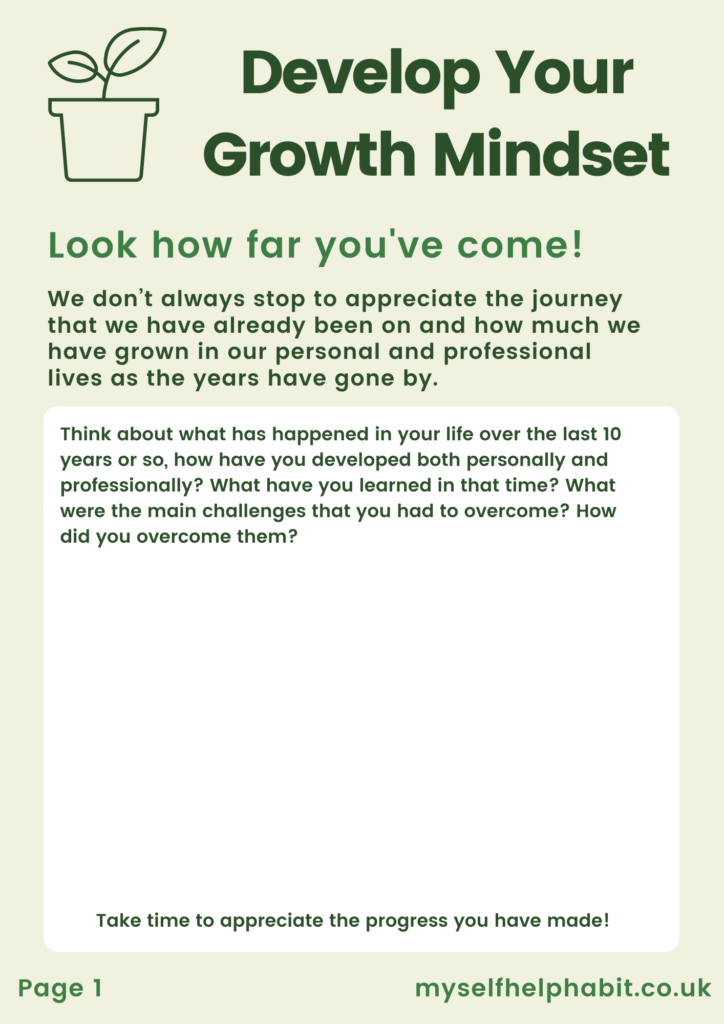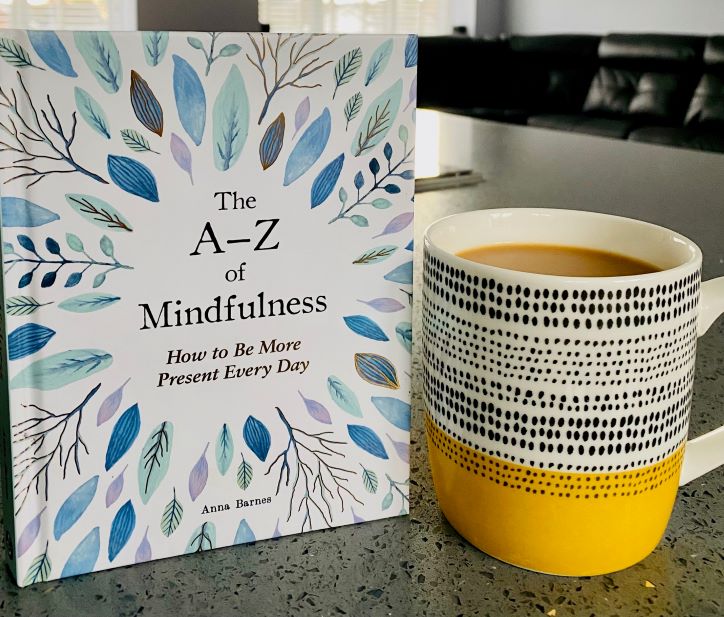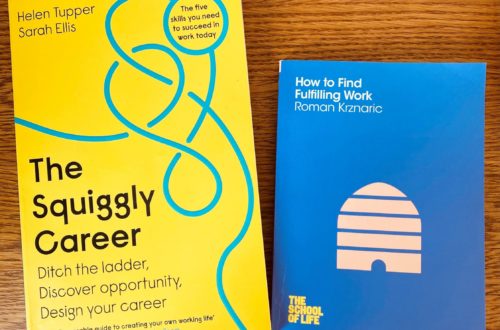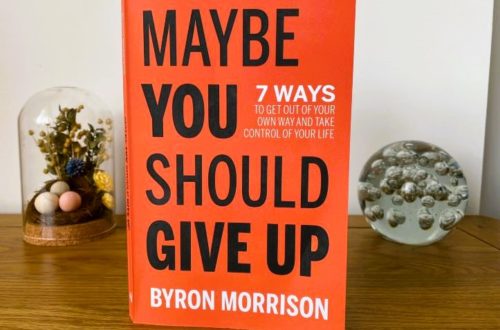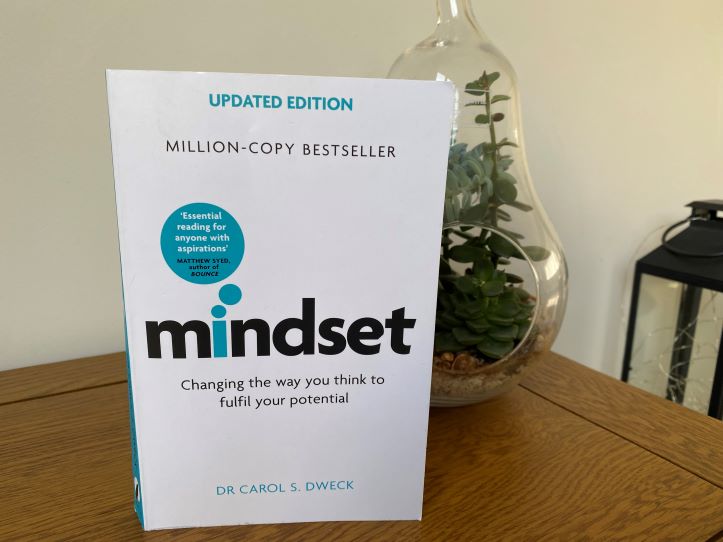
Approaching life with a growth mindset
Whether you think you can, or you think you can’t, you’re right.
Henry Ford
Our mindset, which is generally defined as our ‘way of thinking’ (Cambridge English Dictionary), influences how we interpret and approach different life events and situations. The core beliefs that we hold, and the attitude that we adopt, as we set out to achieve our goals are important factors in whether we persevere through challenges and succeed with our objectives or end up quitting and failing.
Renowned psychologist, Carol Dweck, has identified two mindsets that we commonly adopt as we go about our day to day lives and these form the main topic of her book, Mindset: Changing the way you think to fulfil your potential* (Robinson, 288 pages).
*Disclosure: If you buy books linked to my site, I may earn a commission from Bookshop.org, whose fees support independent bookshops.
Drawing upon many examples from her own and others’ research studies, as well as interesting anecdotes from the world of business, sport and education, Dweck shows us how the fixed mindset and growth mindset appear in different areas of our lives (including in our parenting and personal relationships). She highlights the influence that these mindsets can have, not only on the type of outcomes that we get, but also on the people and organisations that we interact with.
In this post I will explain the two mindsets and share some of the key messages from Dweck’s book. I have also included a FREE 7-page workbook with lots of activities and tips to help you to nurture your own growth mindset. Just click on the image below to download it!
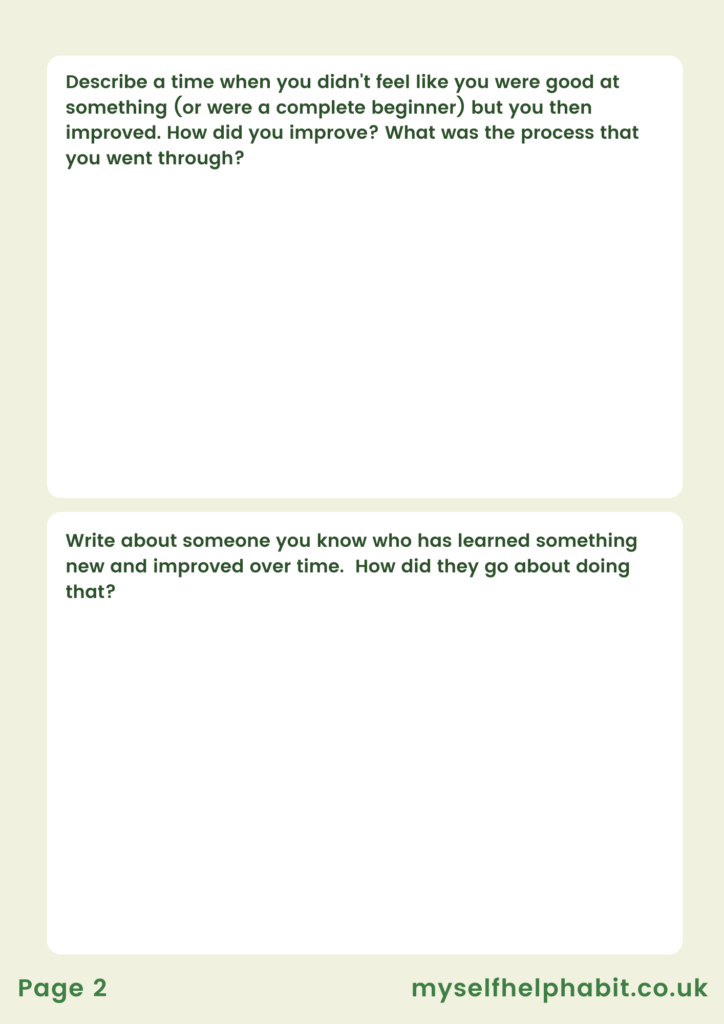
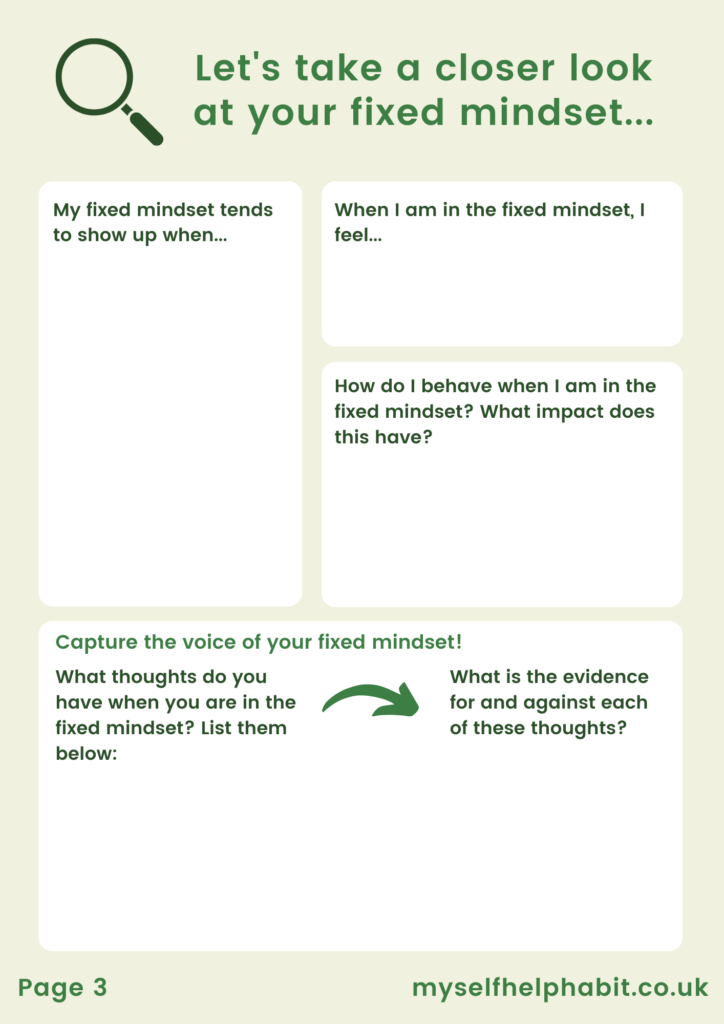
What is the difference between the fixed mindset and the growth mindset?
The Fixed Mindset
As I was nodding along and recognising myself in the many examples of fixed mindset thinking that Dweck provides, I knew there was work to be done!
So, what is a fixed mindset? If you incline towards a fixed mindset then you are likely to believe that your own, and other people’s, abilities, intelligence, and personal qualities are ‘fixed’ from a young age and are unlikely to change very much as they go through life.
When you are in the fixed mindset you rely on innate talent to see you through and the idea of having to make an effort to improve is seen as a threat to any ability that you already possess. ‘You’ve either got it or you haven’t kid’ the voice of the fixed mindset squawks.
Since everything is fixed when you are in this mindset there is not much room for improvement so if you don’t do well at something you will judge yourself negatively. This harsh judgement attaches itself to your identity and you then become ‘the failure’.
From this ‘all or nothing’ way of thinking, instead of seeing opportunities for growth, you are likely to give up when faced with setbacks, feel threatened by other people’s success, and avoid anything too challenging. You do not want to jeopardise the identity you have acquired as ‘the clever one’, ‘the one who has all the answers’, ‘the one who is good at X, Y and Z’, etc. Even constructive feedback can be a threat to your sense of self so you do not seek it out or take it on board.
The fixed mindset may show up when you are considering embarking on a new venture (‘Don’t go for that, you could fail!’), when you feel like you are in competition with someone (‘They will probably be better than you, don’t even try!’), when you come across something difficult and get stuck (‘This is too hard, give up!’), or when you fail at something or do not get the result you wanted (‘You are never going to come back from this!’)
Dweck encourages us to start noticing when our fixed mindset appears and to think of it as a character that likes to show up and throw a spanner in the works! This can help us to recognise what summons it and detach ourselves from some of the potency it carries. I decided to have a go at this activity and share my fixed mindset persona:
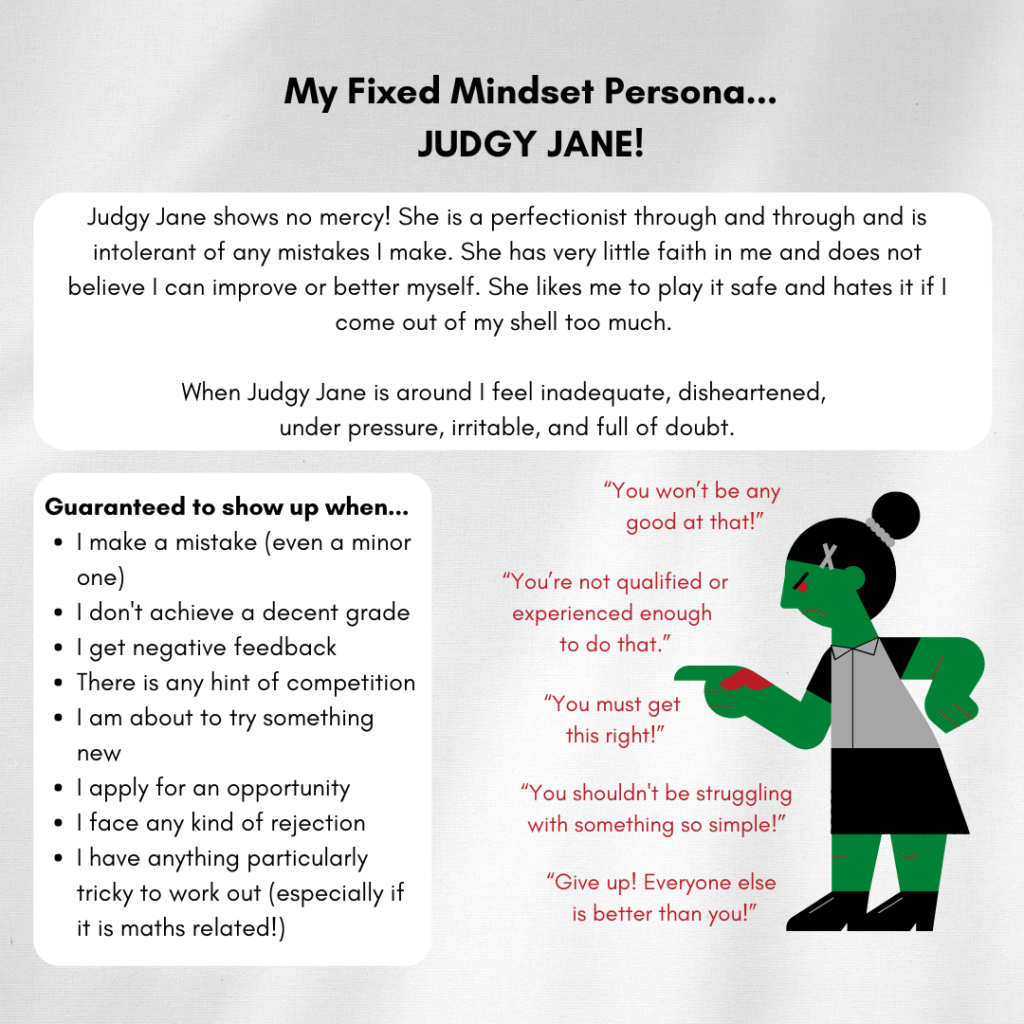
After channelling my fixed mindset for a while, and writing down what it had to say for itself, I was eager to explore an alternative way of thinking. Enter, the growth mindset!
The Growth Mindset
In contrast to the fixed mindset, the growth mindset embraces the process of learning and improvement. Dweck describes this type of mindset as a:
belief that your basic qualities are things you can cultivate through your efforts, your strategies, and help from others…everyone can change and grow through application and experience.
Mindset by Carol Dweck, p.7
When we are in the growth mindset we accept the challenges that life brings and we focus on how we are going to overcome them. When we see others achieving and being successful, instead of feeling threatened and consumed with jealousy, we want to know how they did it and then use that knowledge to spur ourselves on.
My teenage son demonstrated this mindset perfectly the other day. His football team had been beaten by a whopping 10-0 and he came home feeling very disappointed and annoyed! However, after letting those emotions subside, he reflected some more and said, ‘We need to study the winning team and take note of what they are doing well!’ He then reeled off the tactics that he had observed and thought his team could try. I was amazed at the maturity of this and all the learning that he was taking from defeat.
Rather than limiting you, a growth mindset can help you to recognise and take up opportunities. When you accept that you are not a finished article and believe that you can achieve your goals through effort, and learning and practising the right techniques or strategies, then who knows where that ‘can do’ attitude could take you?
Finally, the growth mindset is all about taking positive action! I particularly like how this mindset empowers you to look at everything you can control and do to help yourself. So if you’ve had a setback, experienced rejection or given up on something then take a growth mindset approach and brainstorm what your options are going forward (and keep asking yourself, ‘What else could I do?’ until you exhaust all the options!)
As Dweck advises, plan out your next steps in as much detail as possible (even taking the time to visualise yourself carrying out these steps) and ensure that you give yourself a realistic timescale.
Here are some of the other key messages from the book that I am taking away with me…
Be accepting of mistakes and failure
When you make a mistake, or fail at something, how do you usually respond?
What feelings or sensations arise within you?
How do you talk to yourself afterwards?
The fixed mindset would have you trying to pass the blame, thinking up excuses, listening to your inner critic’s harsh judgements, and spiralling into a pit of self-loathing. This keeps you stuck and may hinder your personal and professional growth. In fact, you may be so paralysed by the fear that you might make a mistake or fail that you do not take any action at all.
From the growth mindset perspective a mistake or failure is simply data that is signposting you to new learning, to the improvements that need to be made, to different strategies that you could try out or an alternative and more suitable path that you could go down.
When you are in the growth mindset your mission is to learn from the challenges and setbacks you encounter and get straight back in the driving seat! So, if you make a mistake, don’t get the result you anticipated or experience some other obstacle then you identify where you can make improvements and then decide how you could go about doing that.
You can also show some appreciation for the learning that you have gained from the mistake, failure or challenge.
- What important lessons have you learned from the challenges you have faced in your life so far?
- What were the positives that came from some of the challenges you have faced? These positives may not have arisen immediately but perhaps over time and after much reflection!
Effort is your friend!
What I loved most about the book, and took great hope from, was the challenge to this idea of ‘the natural’. It has certainly held me back many times over the years! If something took me a lot of effort and felt remotely difficult then I believed that I obviously wasn’t a ‘natural’ and therefore probably shouldn’t bother with such things.
According to Dweck (p.44) this type of attitude comes from the premise that ‘effort is for those who can’t make it on talent’. She makes an excellent point about how we don’t hear enough about the effort, team work, sacrifice, trial and error, and perseverance that goes into making things like inventions, discoveries and works of art because, as a society, we are so fixated on the idea of ‘The Genius’.
One common fear that Dweck identifies, which is linked to this point, is that if we do make a lot of effort and we still do not get what we want then we don’t have any excuse to fall back on. So, the fixed mindset approach is to not try very hard (or at all) and to look for all the reasons why you cannot do something. This then gives you a ready-made, face saving explanation as to why you didn’t do what you really wanted to do.
If you recognise any of this within yourself then your challenge is to go and do something that is new or unfamiliar, embrace the effort that is required, be willing to learn as you go along, accept that you might not be good right away, and observe your progress over time.
The growth mindset and parenting
This book certainly gets across just how important it is for children and young adults to adopt the growth mindset and the crucial role that parents and teachers have in facilitating this mindset.
Of course, it starts with us, as parents, modelling the growth mindset so that we avoid giving mixed messages to our children. It is no good telling our children to learn from their mistakes if we are intolerant of our own (or other people’s) in front of them.
When talking to our children about something they’ve done well or need to work on, Dweck suggests that we focus on effort rather than ability. So, what’s wrong with praising their ability? On the surface, it’s a wonderful confidence boost for a child. However, Dweck goes on to explain that this confidence boost is incredibly tenuous and a shaky foundation to start building an identity upon. If you are always praised for being ‘clever’ and then suddenly find that you have not made the grade in a certain subject or are no longer considered the most gifted person in the room then who are you now? How are you likely to respond to that?
If you focus on effort – the practice, the trial and error, the approaches, the commitment, and decision making – that has been put into something then, firstly, it is way more specific and helpful feedback (plus it shows you are really paying attention to what they have done!) and, secondly, it doesn’t attach a lifetime label that the child is forever trying to live up to and defend. Essentially, they learn that their achievement is a result of the work they have put in.
I like to keep in mind this question:
What am I saying ‘well done’ for?
Then I can communicate clearly what I have noticed and what I think my children have done well. I also like to ask them what they think they did well or what they think could be improved.
If our children do happen to fail at something then, rather than making judgements about their ability or blaming others, we can teach them to reflect and learn from it, to focus on what they can do to improve and, if possible, rectify the situation. Equally, when discussing your day don’t just focus on all the good bits, also talk (constructively and without judgement) about what was challenging, what you might have failed at or got wrong, and then what you did, or are planning to do, to overcome it.
Be wary of the labels you place on yourself and others
In the fixed mindset everything is taken personally. You may find yourself becoming judgemental and attaching labels such as ‘terrible timekeeper’, ‘stupid’, ‘messy’, ‘loser’ etc. to yourself and other people. Since these labels can be so limiting, you can very easily write yourself or someone else off without stopping to question the label or find out how you could help yourself or the other person.
In the book there is a really moving example of how quickly we can attach labels to ourselves and others. A child spills some nails and says ‘I’m so clumsy’ and the child’s father, instead of agreeing and reinforcing the ‘I’m clumsy’ label, simply replies, ‘You say, the nails spilled – I’ll pick them up’ (p.186). I thought that not only does this provide an excellent example of how we can gently question such labels when our children come up with them but it is also a message for us, as adults, to take on board. Don’t be so quick to label yourself (just try and catch yourself when you do!) As shown in the example, simply state what the fact of the matter is, remove all the self-judgement, and then think about what could be done to move forward.
What are the labels you have picked up over the years? Take some time to question them and consider how helpful they are to you now.
Maintaining a growth mindset
An important point to remember is that you do not only have a fixed mindset or a growth mindset, you will flit between the two mindsets and one may show up more strongly in certain situations or areas of your life. You need to work out what has triggered your fixed mindset (and the book does help you to reflect on that) and then choose to look at things from a growth mindset perspective.
As Dweck explains, it will take time to embed this way of thinking, especially if it is new to you:
Old beliefs aren’t just removed like a worn out hip or knee and replaced with better ones. Instead, the new beliefs take their place alongside the old ones, and as they become stronger, they give you a different way to think, feel and act.
Mindset by Carol Dweck, p.224
We don’t have to beat ourselves up when we find ourselves in the fixed mindset, it may be unhelpful at the time but, as Dweck advises, it usually has a positive intention, to keep us in familiar territory and to protect our sense of self. The beliefs that fuel our fixed mindset were formed long ago, to help us to feel safe, loved and accepted in the environments in which we grew up. We were just doing what we felt we needed to do to survive. We can therefore show our fixed mindset some compassion.
Your fixed mindset may just need some acknowledgement and gentle reassurance from you, as the older and wiser person that you are now, that whatever happens you will be OK and will continue to learn and grow from all the experiences that you have in life – both the good and the bad.
I did experience a shift in my mindset from reading this book. Where I once placed limitations on myself, and declared that I was ‘not very sporty’ or ‘not very artistic’, I am now starting to try new activities like creative writing, sketching, dancing, yoga etc. just for the sheer fun and enjoyment of it! I am no longer relying on being a ‘natural’ or having someone bestow a label upon me as being ‘good at this’ or ‘good at that’. I have stopped putting so much pressure on myself to be ‘good’ and instead have fully embraced the learning journey.
Book a FREE coaching session
Thinking about making some changes in your personal life or career but don’t know where to start?
How about giving yourself some space to talk things through, clarify your thoughts and map out the steps that will take you forward?
I am currently offering one 90-minute, introductory coaching session for FREE to all new and prospective clients. If you are curious about how coaching could benefit you and would like to take up this offer then head over to my coaching services page. Simply complete the coaching enquiry form and I will be in contact with you to arrange our first session.


